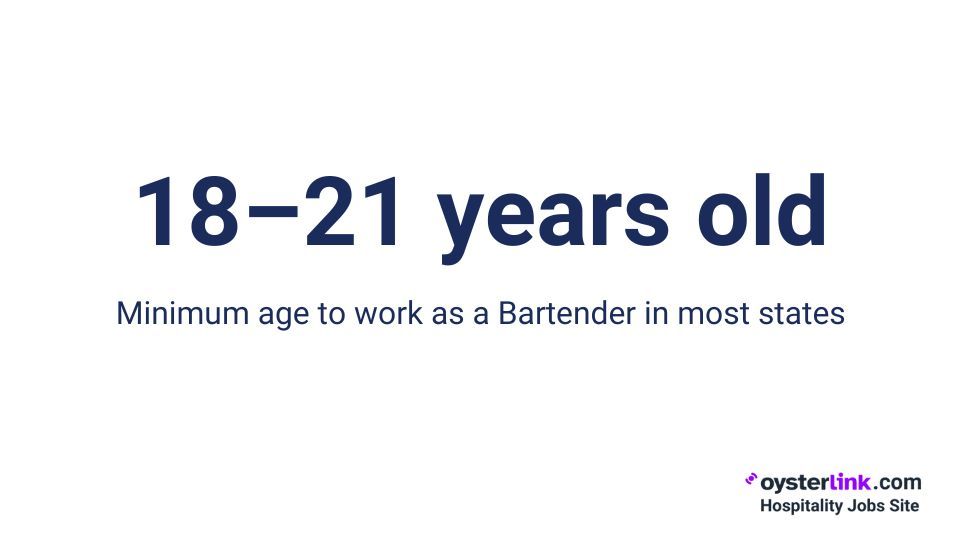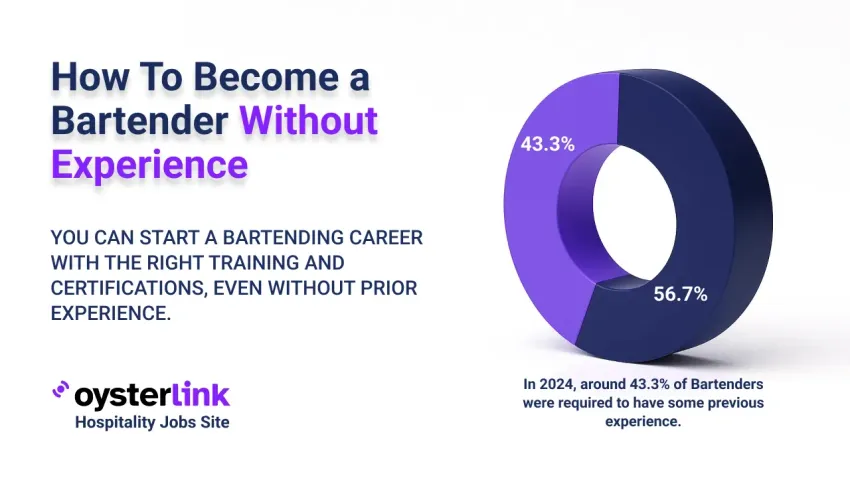How To Become a Bartender Without Experience: Key Takeaways
- You must meet legal age requirements, generally 18 to 21 years old, depending on your state.
- Complete mandatory alcohol server certification like ServSafe Alcohol or TIPS to serve responsibly.
- Gain practical skills through bartending courses, home practice and entry-level roles such as Barback.
Starting a career in bartending without experience is absolutely possible — with the right combination of education, certification and hands-on training.
In 2024, around 43.3% of Bartenders were required to have some previous experience, but an even larger 95% depended on on-the-job training to succeed.
This guide will walk you through the essential steps to becoming a Bartender without experience, highlighting the skills you need and smart strategies to grow your career along the way.
1. Ensure You Meet Legal Age and Basic Qualifications
The first step to becoming a Bartender is ensuring you meet the minimum legal requirements for alcohol service in your state.
Most states require Bartenders to be at least 18 or 21 years old.

Additionally, many employers prefer candidates who have completed high school or possess a GED.
These basic qualifications demonstrate maturity and reliability, which are important traits for the role.
Learn more about legal age requirements for Bartenders in different states to ensure compliance.
2. Obtain Required Alcohol Server Certifications
Many states require Bartenders to complete alcohol server certification before they can legally serve drinks.
Two popular programs include:
- ServSafe Alcohol Certification: This program educates servers and bartenders on responsible alcohol service, including how to check IDs properly and identify signs of intoxication.
- TIPS Certification (Training for Intervention Procedures): Focuses on preventing intoxication and alcohol-related problems through effective intervention.
Completing one of these certifications not only fulfills legal requirements but also strengthens your resumé and confidence behind the bar.
For employers, the guide to hiring Bartenders can ensure you select qualified candidates with proper certification.
3. Acquire Foundational Knowledge Through Bar Training
Enrolling in bartending courses is a great way to build the core knowledge you’ll need. These classes cover:
- Essential drink recipes and mixing techniques.
- Customer service skills crucial for working in busy bar environments.
- How to manage bar tools and equipment.
These courses can be found at community colleges, vocational schools and numerous online platforms, offering flexible learning schedules.
4. Practice Mixology Skills at Home
Setting up a small home bar allows you to practice making classic cocktails and experiment with recipes.
This hands-on practice helps improve your speed, dexterity and confidence, all essential qualities for a Bartender during busy service hours.
Video tutorials and recipe apps can assist you as you build your mixology skills from your own home.
5. Gain Experience in Entry-Level Bar Roles
Many aspiring Bartenders start as Barbacks. This role is an excellent opportunity to learn about bar operations by assisting Bartenders with restocking, cleaning and preparing the bar for service.
Alternatively, working as a Server or Host in a bar-equipped restaurant can provide valuable experience and put you in line for an internal promotion to a Bartender role.
Benefits of starting as a Barback
A Barback is a crucial support role in a busy bar environment, responsible for assisting Bartenders by restocking supplies, cleaning and ensuring the bar stays organized.
Starting in this position offers several valuable benefits:
- Hands-on exposure to the bar environment.
- Learning from experienced bartenders through observation.
- Building relationships with bar staff and managers.
Discover the pros and cons of being a Barback to understand if it's the right starting point.
6. Build a Professional Network
Networking plays a crucial role in your bartending career. Seek mentors who can share valuable tips and industry insights.
Joining bartending associations, attending industry events and participating in workshops help you stay updated on trends and expand your contacts, which can open doors to job opportunities.
Learn how to network effectively as a Bartender.
7. Craft a Targeted Resume
Highlight transferable skills such as customer service, multitasking and any relevant training or certification.
Even if you lack formal bartending experience, emphasize your enthusiasm, willingness to learn and any work experience that demonstrates reliability and communication skills.
Check out tips on writing a killer Bartender cover letter to stand out.
8. Apply Strategically
Focus on bars and restaurants known for hiring entry-level Bartenders or those offering training programs. These venues are more likely to invest in your development.
During interviews, express genuine passion for bartending and eagerness to learn, which often impresses prospective employers.
Prepare for your interview with the recommended Bartender interview questions.
9. Stay Committed to Learning
The bartending industry constantly evolves with new drink recipes and service techniques.
Continuing your education through workshops, online resources and practice will keep your skills sharp and make you a valuable asset.
Remaining adaptable and curious ensures your growth and long-term success behind the bar.
Learn about Bartender health and safety to maintain your well-being in a demanding environment.
Additional Resources for Aspiring Bartenders
- U.S. Department of Labor – Fair Labor Standards Act (FLSA)
- ServSafe Alcohol Certification
- TIPS Certification
- National Restaurant Association
- Alcohol and Tobacco Tax and Trade Bureau (TTB)









Loading comments...